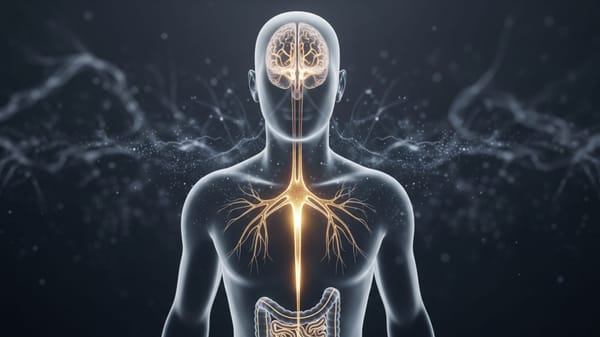The Busy Mind’s Guide to Deep Sleep: How Guided Meditation Rewires Your Brain for Rest
Can't switch off at night? If your mind treats bedtime as a marathon for worries, it's time for a new approach. This guide debunks the 'spiritual fluff' myth of meditation, offering a practical tool to lead you towards the deep, restorative rest you deserve—no 'empty mind' required.

The irony is almost cruel. After a day of relentless demands, deadlines, and decisions, the one thing you crave most—sleep—is the one thing your mind refuses to allow. The quiet of the bedroom becomes an amphitheatre for your loudest thoughts. The more you chase sleep, the faster it runs.
If this sounds familiar, you are far from alone. In the UK, it’s estimated that around one in three people are affected by insomnia. It’s a silent epidemic fuelled by stress, anxiety, and our always-on culture, leaving millions searching for the timeless power of rest and feeling tired, irritable, and unable to function at their best. We’ve been told to cut out blue light, to drink herbal tea, to count sheep—but what do you do when the noise isn't external, but internal?
For many, the word ‘meditation’ conjures images of silent monks on mountaintops or spiritual gurus preaching abstract concepts. It can feel inaccessible, perhaps even a bit like ‘spiritual garbage’ or new-age fluff. But what if we stripped away the stereotypes? What if we viewed it not as a mystical belief system, but as a practical, science-backed technique for training your attention?
And what if you didn’t have to do it alone?
This is the power of guided meditation, particularly for sleep. It’s not about forcing your mind to be empty; it's about giving your racing thoughts a new, calmer direction to follow. It’s an invitation to outsource the effort, to let go of the struggle, and to be gently led from a state of mental chaos to one of profound physical and mental rest.
Why Your Brain Fights Sleep (and How Meditation Helps)
Our brains are wired for survival. The sympathetic nervous system—our internal alarm, or ‘fight, flight, or freeze’ response—is brilliant when we’re facing a genuine threat. In the modern world, however, that alarm is often triggered by work emails, financial worries, or an endless to-do list. When you lie down at night, your body might be still, but your nervous system is still on high alert, flooding your system with stress hormones like cortisol and adrenaline. You cannot enter a state of deep rest while your brain is preparing for battle.
Meditation acts as the antidote. It helps to activate the parasympathetic nervous system, also known as the ‘rest-and-digest’ state. This is where the magic happens. Your heart rate slows, your breathing deepens, and your muscles release tension. In essence, meditation sends a powerful signal to your brain: you are safe. The threat is gone. It is time to rest.
When I first began my journey with meditation, it wasn't about seeking enlightenment. It was a practical tool to manage a mind that felt perpetually overclocked, helping me find the stillness before the start of each day. As someone who has spent years coaching and exploring the limits of mindset and performance, I know what a racing mind feels like. I also know the profound calm that comes from learning how to quieten it. My voice, which people have described as deep and soothing since I was in my early twenties, became an instrument in this exploration. I began writing and recording my own guided meditations, not just for myself, but to share this powerful tool with others. Because when you are lost in the noise of your own mind, a trusted voice can be the anchor you need to find your way back to stillness.
The Power of a Guide: Why Being Led Makes All the Difference
Trying to meditate when your mind is racing is like trying to learn to swim during a storm. This is where the ‘guided’ part of guided meditation becomes its most powerful feature. It removes the pressure. You don’t have to wonder, “Am I doing this right?” or fight the thoughts that inevitably arise. Your only job is to listen.
A guide provides a focal point for your attention, gently pulling it away from the chaotic loop of your worries. This is crucial for sleep, as it interrupts the cycle of ‘sleep anxiety’—the fear of not being able to sleep, which ironically is often the very thing that keeps us awake.
When I create guided sleep meditations for my YouTube channel, the process is deliberate and deeply personal. I know that for a listener to truly let go, they need to feel safe and trust the guidance they’re receiving. My process often weaves together several potent techniques:
- 1️⃣ Guided Body Scans: This is a cornerstone of mindfulness for sleep. You are gently guided to bring your awareness to different parts of your body, from your toes to the top of your head. This isn't just a distraction; a growing body of research shows it’s highly effective at releasing stored physical tension you may not even be aware of. As you consciously soften your jaw, your shoulders, and your stomach, you are sending direct messages of relaxation to your brain.
- 2️⃣ Guided Breathing: Your breath is the remote control for your nervous system. By following guidance to slow and deepen your breath, you are physically calming your body down. You are manually shifting gears from the stressed sympathetic state to the calm parasympathetic state. No belief is required; it's pure physiology.
- 3️⃣ Guided Affirmations & Imaginative Storytelling: Once the body is relaxed, the mind is more receptive. This is where I often introduce positive affirmations or creative, imaginative stories. This isn’t about wishful thinking. It’s a strategic method to replace the narrative of worry with one of peace, safety, and calm. Instead of your mind replaying the day’s anxieties, it is given a beautiful, serene landscape to explore, allowing it to gently drift from waking consciousness into the first stages of sleep.
Creating this content for a global audience on YouTube has been an incredible journey. To take the intimate, focused work of a 1:1 guided session and translate it into a format that can help someone on the other side of the world is a profound responsibility and privilege. It’s about creating a sanctuary of sound that anyone can access, a reliable tool to help them navigate the difficult transition from a busy day to a peaceful night.
Your First Step: How to Begin Tonight
If you are on the fence, I invite you to approach this not as a lifelong commitment, but as a simple experiment. You have nothing to lose and potentially hours of restful sleep to gain.
- ➡️ Create a Comfortable Space: This doesn’t require anything special. Simply lie down in your bed as you normally would.
- ➡️ Use Headphones: To truly immerse yourself and block out external distractions, headphones can make a significant difference.
- ➡️ Let Go of Expectations: The goal is not to have a transcendent experience. The goal is simply to listen. Don't worry if your mind wanders; that's what minds do. The guide will be there to gently bring you back.
- ➡️ Choose a Guide: Find a voice and style that resonates with you. You can explore my playlist, Guided Meditations for Sleep & Deep Relaxation, to see what feels right for you.
Reclaiming the Night
For too many of us, the night has become a battleground—a fight against our own thoughts. But it doesn't have to be this way. Guided sleep meditation offers a path to peace, not through force, but through gentle guidance. It is a practical, powerful, and accessible tool that empowers you to transform your relationship with sleep.
It’s about understanding that your mind isn't your enemy; it's simply a powerful instrument that has been left to run on autopilot. A guided meditation is your opportunity to sit down at the controls, to gently dial down the noise, and to guide your consciousness towards the destination it so desperately needs: a deep, restorative, and peaceful night’s sleep.
The principles discussed are not a substitute for professional advice. Individual results from applying these concepts will vary, as your unique path, choices, and consistent efforts play the most significant role in your experiences. If you require guidance regarding specific personal, financial, medical, or mental health situations, please consult with a qualified professional. Please engage with these ideas responsibly, understanding that you are the architect of your choices and actions.





